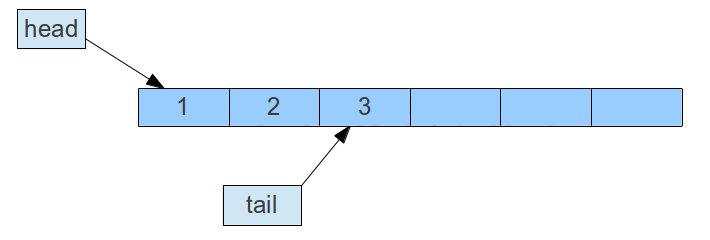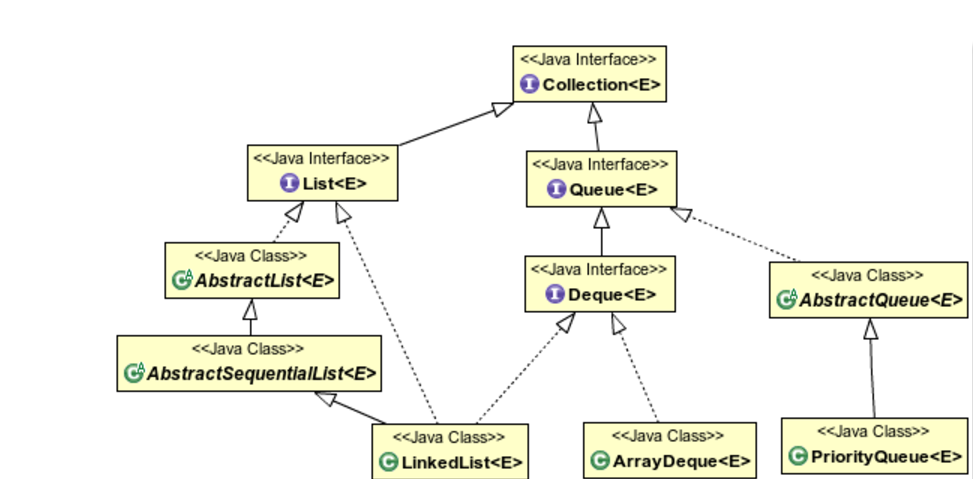数据结构——java Queue类
定义
队列是一种特殊的线性表,它只允许在表的前端进行删除操作,而在表的后端进行插入操作。
LinkedList类实现了Queue接口,因此我们可以把LinkedList当成Queue来用
图例
Queue本身是一种先入先出的模型(FIFO),和我们日常生活中的排队模型很类似。根据不同的实现,他们主要有数组和链表两种实现形式。如下图:


与队列相关的类的关系图如下:

常用方法
| 序号 | 方法名 | 描述 |
| 1 | boolean add(E e) | 将指定的元素插入到队列中。 |
| 2 | Object element() | 检索该队列的头。 |
| boolean offer(E e) | 将指定元素插入到该队列中(在该队列容量之内)。 | |
| 3 | Object peek() | 检索该队列的头,如果该队列为空返回null。 |
| 4 | Object poll() | 检索并删除该队列的头,如果该队列为空返回null。 |
| 5 | Object remove() | 检索并删除该队列的头。 |
源码
package java.util;
public interface Queue<E> extends Collection<E> {
/**
* Inserts the specified element into this queue if it is possible to do so
* immediately without violating capacity restrictions, returning
* {@code true} upon success and throwing an {@code IllegalStateException}
* if no space is currently available.
*
* @param e the element to add
* @return {@code true} (as specified by {@link Collection#add})
* @throws IllegalStateException if the element cannot be added at this
* time due to capacity restrictions
* @throws ClassCastException if the class of the specified element
* prevents it from being added to this queue
* @throws NullPointerException if the specified element is null and
* this queue does not permit null elements
* @throws IllegalArgumentException if some property of this element
* prevents it from being added to this queue
*/
boolean add(E e);
/**
* Inserts the specified element into this queue if it is possible to do
* so immediately without violating capacity restrictions.
* When using a capacity-restricted queue, this method is generally
* preferable to {@link #add}, which can fail to insert an element only
* by throwing an exception.
*
* @param e the element to add
* @return {@code true} if the element was added to this queue, else
* {@code false}
* @throws ClassCastException if the class of the specified element
* prevents it from being added to this queue
* @throws NullPointerException if the specified element is null and
* this queue does not permit null elements
* @throws IllegalArgumentException if some property of this element
* prevents it from being added to this queue
*/
boolean offer(E e);
/**
* Retrieves and removes the head of this queue. This method differs
* from {@link #poll poll} only in that it throws an exception if this
* queue is empty.
*
* @return the head of this queue
* @throws NoSuchElementException if this queue is empty
*/
E remove();
/**
* Retrieves and removes the head of this queue,
* or returns {@code null} if this queue is empty.
*
* @return the head of this queue, or {@code null} if this queue is empty
*/
E poll();
/**
* Retrieves, but does not remove, the head of this queue. This method
* differs from {@link #peek peek} only in that it throws an exception
* if this queue is empty.
*
* @return the head of this queue
* @throws NoSuchElementException if this queue is empty
*/
E element();
/**
* Retrieves, but does not remove, the head of this queue,
* or returns {@code null} if this queue is empty.
*
* @return the head of this queue, or {@code null} if this queue is empty
*/
E peek();
}
参考:http://blog.csdn.net/u010617952/article/details/51726789
数据结构——java Queue类的更多相关文章
- 数据结构——Java Stack 类
定义 栈是Vector的一个子类,它实现了一个标准的后进先出的栈.堆栈只定义了默认构造函数,用来创建一个空栈. 堆栈除了包括由Vector定义的所有方法,也定义了自己的一些方法. 图例 在下面图片中可 ...
- Java中Queue类实现
原先在java编程中,Queue的实现都是用LinkedList Queue queue = new LinkedList(); 但正如jdk中所说的那样: 注意,此实现不是同步的.如果多个线程同时访 ...
- Java实现Queue类
Java实现Queue类 import java.util.Iterator; import java.util.NoSuchElementException; import java.util.Sc ...
- atitit. java queue 队列体系and自定义基于数据库的队列总结o7t
atitit. java queue 队列体系and自定义基于数据库的队列总结o7t 1. 阻塞队列和非阻塞队列 1 2. java.util.Queue接口, 1 3. ConcurrentLink ...
- Java基础 —— Java常用类
Java常用类: java.lang包: java.lang.Object类: hashcode()方法:返回一段整型的哈希码,代表地址. toString()方法:返回父类名+"@&quo ...
- atitit. java queue 队列体系and自己定义基于数据库的队列总结o7t
atitit. java queue 队列体系and自己定义基于数据库的队列总结o7t 1. 堵塞队列和非堵塞队列 1 2. java.util.Queue接口. 1 3. ConcurrentLin ...
- 数据结构Java实现07----队列:顺序队列&顺序循环队列、链式队列、顺序优先队列
一.队列的概念: 队列(简称作队,Queue)也是一种特殊的线性表,队列的数据元素以及数据元素间的逻辑关系和线性表完全相同,其差别是线性表允许在任意位置插入和删除,而队列只允许在其一端进行插入操作在其 ...
- 数据结构Java实现05----栈:顺序栈和链式堆栈
一.堆栈的基本概念: 堆栈(也简称作栈)是一种特殊的线性表,堆栈的数据元素以及数据元素间的逻辑关系和线性表完全相同,其差别是线性表允许在任意位置进行插入和删除操作,而堆栈只允许在固定一端进行插入和删除 ...
- 数据结构Java实现03----单向链表的插入和删除
文本主要内容: 链表结构 单链表代码实现 单链表的效率分析 一.链表结构: (物理存储结构上不连续,逻辑上连续:大小不固定) 概念: 链式存储结构是基于指针实现的.我们把一个数据 ...
随机推荐
- 模拟服务容器Ioc
服务容器是一个用于管理类依赖和执行依赖注入的强大工具. 一个类要被容器所能够提取,必须要先注册至这个容器.既然称这个容器叫做服务容器,那么我们需要某个服务,就得先注册.绑定这个服务到容器,那么提供服务 ...
- android下创建文件夹和修改其权限的方法
原文:http://www.cnblogs.com/wanqieddy/archive/2011/12/28/2304906.html 由于工作的需要,今天研究了在android下创建文件夹和修改其权 ...
- 捣鼓Haskell
最近想学这门语言,于是做了一些准备工作,配置好一切后,打算玩一玩. 先扔一段官方简介: Introduction Haskell is a computer programming language. ...
- matlab学习 — 实现简单的爬虫
这里复杂的情况暂时不考虑..测试网址为pixiv的每日排行榜 = = url = 'https://www.pixiv.net/ranking.php?mode=daily' text = webre ...
- CDQ分治-陌上花开(附典型错误及原因)
CDQ分治-陌上花开 题目大意 对于给遗传给定的序列: \[ (x,y,z)_1, (x,y,z)_2, (x,y,z)_3, \cdots, (x,y,z)_n \] 求: \[ \sum_{x_i ...
- 你知道Verilog HDL程序是如何构成的吗
本节通过硬件描述语言Verilog HDL对二十进制编码器的描述,介绍Verilog HDL程序的基本结构及特点. 二十进制编码器及Verilog HDL描述 二十进制编码器是数字电路中常用的电路单元 ...
- 利用TPL(任务并行库)构建Pipeline处理Dataflow
https://www.cnblogs.com/CoderAyu/p/9757389.html
- Java并发编程:Java内存模型JMM
简介 Java内存模型英文叫做(Java Memory Model),简称为JMM.Java虚拟机规范试图定义一种Java内存模型来屏蔽掉各种硬件和系统的内存访问差异,实现平台无关性. CPU和缓存一 ...
- HTML<video></video>视频无法自动播放
1.video 标签属性 src: 设置显示视频路径 controls: 显示控制栏 loop: 控制视频循环播放 autoplay: 自动播放 muted:设置静音播放 2.解决视频或音频标签自动播 ...
- WebSocket 反爬虫
目录 WebSocket握手验证反爬虫 WebSocket 消息校验反爬虫 WebSocket Ping 反爬虫 总结 WebSocket握手验证反爬虫 ! HTTP协议 请求头 服务器端创建 soc ...
